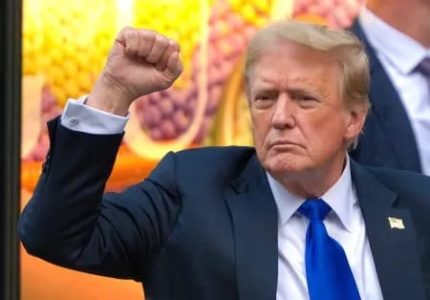During a speech at the Moms for Liberty convention in Washington, former President Donald Trump publicly questioned Vice President Kamala Harris’s claim that she once worked at McDonald’s. Donald Trump’s comments, made on Friday, have intensified the ongoing debate surrounding Harris’s past, particularly her assertions of having worked in the fast-food industry during her college years.
Donald Trump’s skepticism stems from Harris’s appearance on The Drew Barrymore Show in April, where she stated, “I did. Yes, I did work at McDonald’s,” adding that she worked as a cashier and prepared fries. Donald Trump mocked this assertion, claiming, “After an exhaustive study that took about 20 minutes, they found out she never worked there.” His remarks have fueled a wider discussion about Harris’s credibility and the accuracy of her personal narrative.
Harris’s McDonald’s Claim Raises Eyebrows Amid Scrutiny
Vice President Kamala Harris’s declaration of having worked at a McDonald’s in the Bay Area during the summer after her freshman year at Howard University has sparked considerable skepticism. Despite her initial disclosure of this detail during a labor rally in Las Vegas in 2019, Harris had not previously mentioned this experience in any of her earlier public statements or in her two memoirs, leading some to question its authenticity.
Critics argue that the omission of this job from her extensive autobiographical accounts and public addresses is unusual, especially given the narrative’s potential to connect with working-class voters. Further doubts have been cast by the absence of any mention of McDonald’s employment in Harris’s resume and job application from a year after her college graduation, as well as in the biographies written about her. This growing skepticism has led to calls for more transparency regarding Harris’s claims.
Biographical Omissions Add Fuel to the Controversy
The controversy over Vice President Harris’s alleged McDonald’s employment has been exacerbated by the lack of corroborating details in both her memoirs and the biographies written about her. Notably, her 2019 book, The Truths We Hold, which includes a section on the jobs she held during college, makes no reference to her working at the fast-food chain. Similarly, Dan Morain, the author of Kamala’s Way: An American Life, expressed surprise, stating that he was “not aware” of her employment at McDonald’s.
These omissions have led some to speculate whether Harris’s claim was an attempt to bolster her image during her presidential campaign by aligning herself with the working class. As the debate continues, the pressure mounts on Harris to clarify her statements and provide further evidence of her purported McDonald’s employment. This incident highlights the importance of accuracy and transparency in political narratives, especially for public figures in high office.
Campaign Strategy or Genuine Middle-Class Roots?
Harris’s campaign has frequently highlighted her alleged work at McDonald’s as a way to connect with middle-class voters. Earlier this month, campaign spokeswoman Lauren Hitt described Harris as “the daughter of a working mother” who worked at McDonald’s to help put herself through college. This narrative has been a central theme in her campaign, aiming to project an image of humility and hard work, in stark contrast to her political opponents.
At a recent campaign event, Harris referred to herself and her running mate, Tim Walz, as “middle-class kids,” with one of them having had “a summer job at McDonald’s.” This characterization is part of a broader effort to appeal to everyday Americans by showcasing a humble background. However, reports have surfaced that an early draft of a campaign ad claimed Harris worked at McDonald’s to “pay her way” through college, a statement that was later revised to reflect that she took the job for extra spending money. This revision has only added to the skepticism surrounding the claim, raising questions about whether this narrative is more of a campaign strategy than a reflection of her actual experiences.
Drawing a Contrast with Donald Trump
The Harris campaign has also used the McDonald’s story as a tool to draw a sharp contrast between her and former President Donald Trump. Governor Tim Walz, speaking at an AFSCME convention, emphasized this distinction, saying, “You knew Vice President Harris grew up in a middle-class family, picked up shifts at McDonald’s as a student. Can you simply picture Donald Trump working at a McDonald’s trying to make a McFlurry or something?”
This rhetoric is designed to position Harris as someone who understands the struggles of ordinary Americans, unlike Trump, who was born into wealth and has never experienced financial hardship. The campaign’s focus on this narrative is part of a broader strategy to paint Donald Trump as an out-of-touch elite, in contrast to Harris’s supposedly relatable middle-class background. However, the inconsistencies and omissions in Harris’s story have cast a shadow over this strategy, leaving voters to question the authenticity of the image she is trying to project.














